Welcome to another round of film reviews, in which I watch and review films that have been out in theaters for a while already! Thanks to the coronavirus, all of these films were made available online shortly after their theatrical run, giving me an opportunity to watch them without leaving the house. Enjoy my abbreviated thoughts on Emma., Birds of Prey, The Way Back, and Onward!
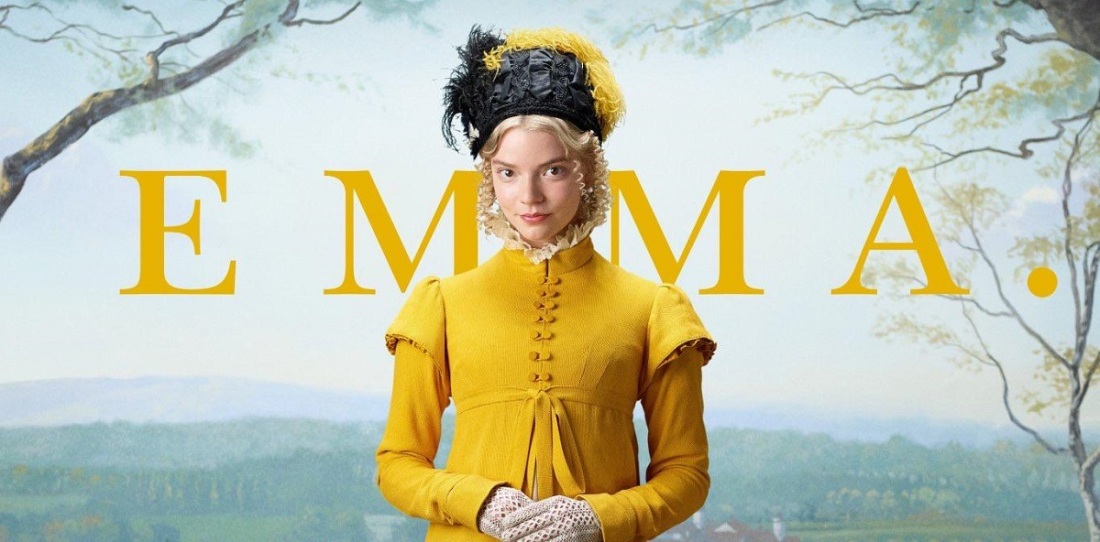
Emma.
Emma. (don’t forget the period!) is a period-drama (heh) based on Jane Austen’s 1815 novel of the same name. It’s not one of Austen’s more well-known works, and in fact was criticized at time of released for its frivolous nature and unlikable main character. And I can kinda see how such criticisms came to be: this is a story about a rich, privileged brat who always gets her way, meddles in other people’s affairs, and ends up getting the hot guy in the end. Not exactly a scrappy underdog story! This film takes the wise approach of fashioning the story as a satire of sorts, in the vein of 2018’s The Favourite. And while they don’t go quite far enough down that path for my liking, it still works as a consistently-funny and well-acted yarn that still feels somewhat modern over 200 years later.
The key to this film’s success is that the filmmakers don’t expect us to sympathize with Emma at first. We view her through the critical lens of those around her; we see every aghast reaction, every annoyed eye-roll as she demands the world of everyone in her life. We sympathize more with poor Harriet, whom Emma has taken under her wing and vowed to show the ways of life to. It’s an ironic lens to view the story through; we know that Emma has no idea how life actually works, yet Harriet is such a wide-eyed innocent that she devours all of Emma’s teachings without question. Emma even tries to use her manipulative tendencies for good by trying to set up Harriet with the guy she thinks she crushes on – which we later learn is not true. Even when Emma thinks she has good intentions, her meddling often leads to more disruption and heartache down the road. Her obliviousness to this fact is quality comedic material, even if we yearn for her cohorts to find happiness in spite of Emma’s best efforts to sabotage them.
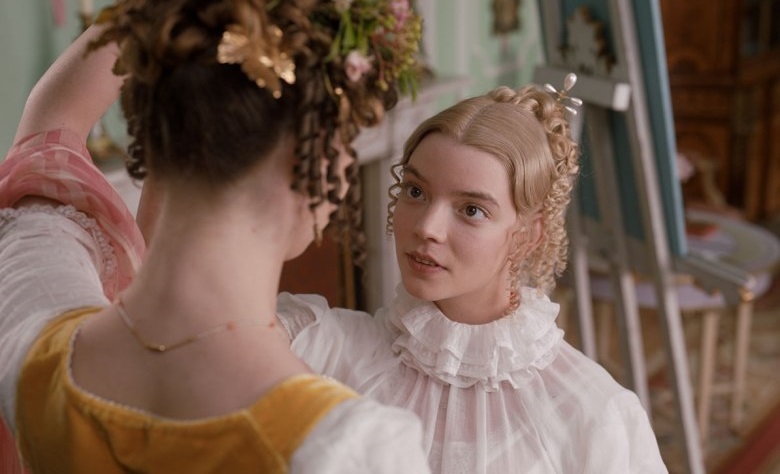
Of course, this approach to the story doesn’t work unless our protagonist gets her comeuppance by the end. And boy does she, after a rude remark at a party leads to an older woman choking back tears and everyone else resenting Emma from then on. It’s the best scene in the movie by far; the tension is palpable, and we are not allowed to leave the discomfort, forced to watch through Emma’s eyes as her social standing and reputation crumbles in moments. We feel horribly for the woman she’s insulted, but more importantly, it provides Emma with an opportunity for humility and growth. Fortunately she takes it, understanding (perhaps for the first time) the impact words can have and the way her flippant behavior affects others. It humanizes Emma in a way she perhaps hasn’t been before, and sows the seeds for redemption later on.
I don’t know what audiences were like in 1815, but I feel modern audiences are more receptive to redemptive character arcs for unlikable people. Maybe they just weren’t used to protagonists that are hard to relate to back then. In that respect, this story perhaps works even better now than it did upon the original book’s release. We’re a collectively better-off people now; we still have poverty and income inequality of course, but the average living standard has increased dramatically and the everyday moviegoer is more willing to accept well-off protagonists. The story is cleverly told to produce monstrous behavior out of its “heroine”, yet still provide an avenue for the audience to recognize her self-awareness and ability to grow up. And the frivolities of relationship-meddling and gossip are more widespread now, making Emma a more recognizable character in today’s culture. One could imagine her as a reality TV star: someone we watch not because we relate to them, but because their propensity for drama and abhorrent behavior makes for great trashy entertainment.
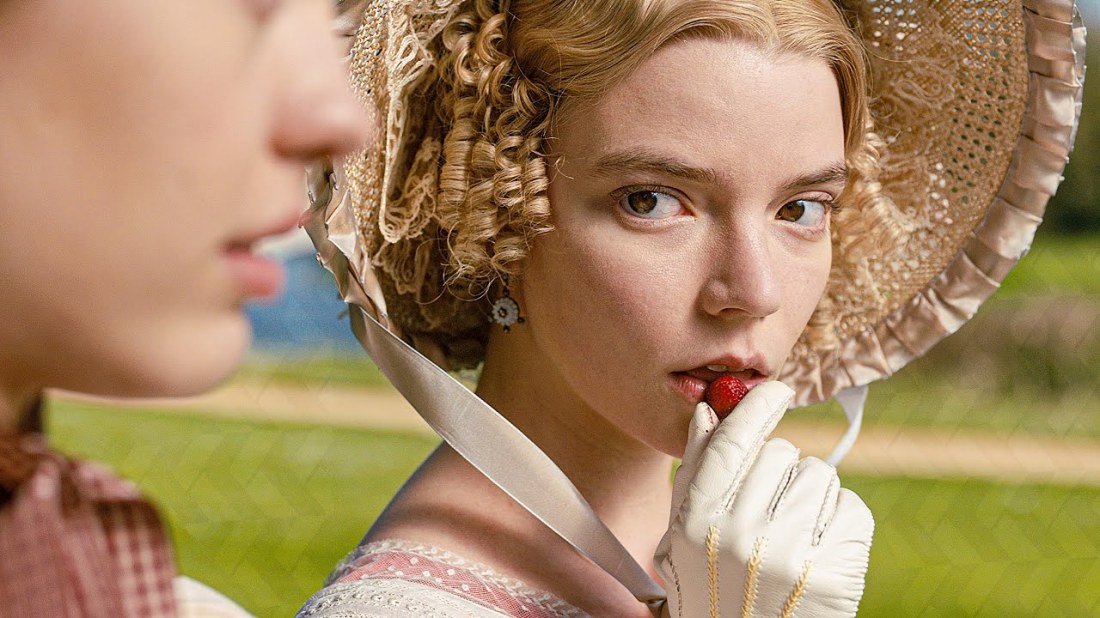
Overall, I’m mostly impressed with this retelling. As mentioned earlier, I wish it had leaned more heavily into the absurd elements of the story to really hammer home the irony of this character. The humor falls flat a bit at times, especially in the first half; it takes a while for the story to get going. To call it a story at all is a bit generous, as nothing really happens and the stakes are comically low. But the final act redeems these problems with some strong moments of genuine drama and a compelling arc for Emma to complete. Does she really deserve to get the guy at the end? Maybe not, but then again, Emma probably doesn’t deserve much of what she has. She’s not like you and me; she’s above it all, and even if she’s grown as a person she’ll never see real repercussions for her actions. All we can do is laugh at how ridiculous that fact is.
VERDICT: 7.9 / 10
All images belong to Focus Features.
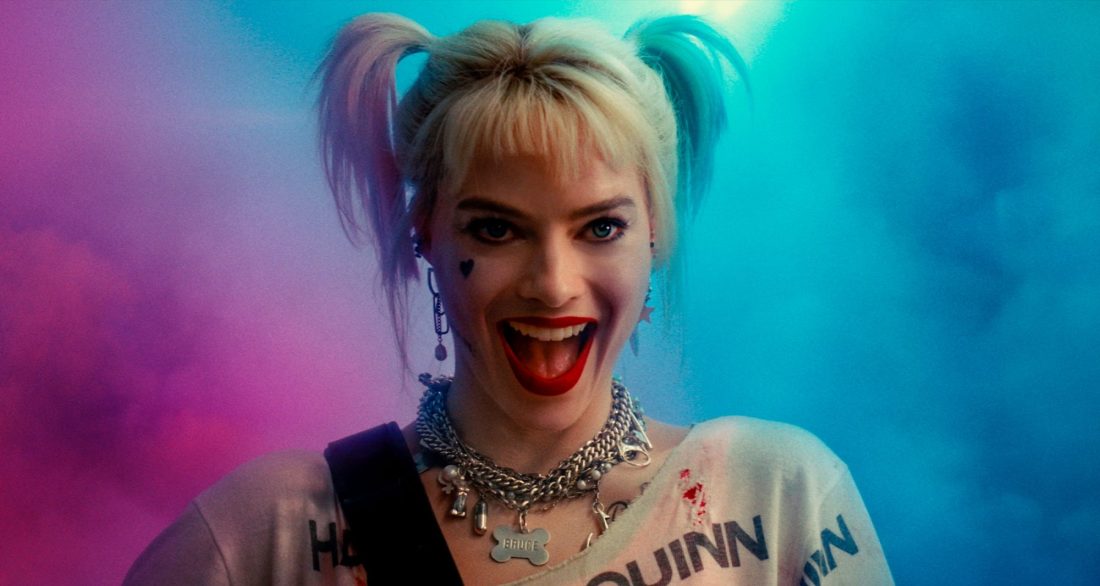
Birds of Prey
Birds of Prey (and the Fantabulous Emancipation of One Harley Quinn) is a sequel/spin-off of the dreadful 2016 film Suicide Squad following the character of Margot Robbie’s Harley Quinn. It tells the story of how she left the Joker and became entangled in a mission to capture a child thief who swallowed a valuable diamond. If that plot sounds a little boring and generic to you…well, that’s because it is. Apparently DC has a problem with crafting interesting villains because every DCEU movie has had a super bland antagonist (and by extension, plot). A character is only as interesting as his/her counterpart, and Harley’s counterpart here is just some sparmy rich dude with a bunch of cronies. Uh…okay I guess? As much as Jared Leto’s Joker was maligned in Suicide Squad, imagine how much better this film could have been if he had been the antagonist instead! Instead of a muddled story about Harley leaving Mr. J and setting out on her own, it could be a commentary on abusive relationships (a la The Invisible Man) in which he is repeatedly trying to win her back.
The film features heavy use of expository voiceover, which I normally hate but (mostly) works here. It takes an unreliable narrator approach to Harley Quinn; she confidently lets us in on her worldview, even if we recognize that she’s in an emotionally-vulnerable state and not necessarily in the right. The story is told somewhat out-of-order; while we do jump straight into the action, Harley often pauses things to fill us in on some key backstories before resuming the normal timeline. She does so in her annoying sing-song cutesy voice, which might be where a lot of my distaste for the movie comes from, and is always quick with a quip to lighten the mood – even when it’s inappropriate for the moment. Look, I’m all for a movie not taking itself too seriously, but you do have to have SOME stakes in order to make us care! I would’ve maybe liked if the events of the plot undercut Harley’s cutesiness with a dose of reality, which might have made her quest a bit more impactful and her character slightly more sympathetic. But the filmmakers didn’t seem that interested in making a serious movie, so whatever.
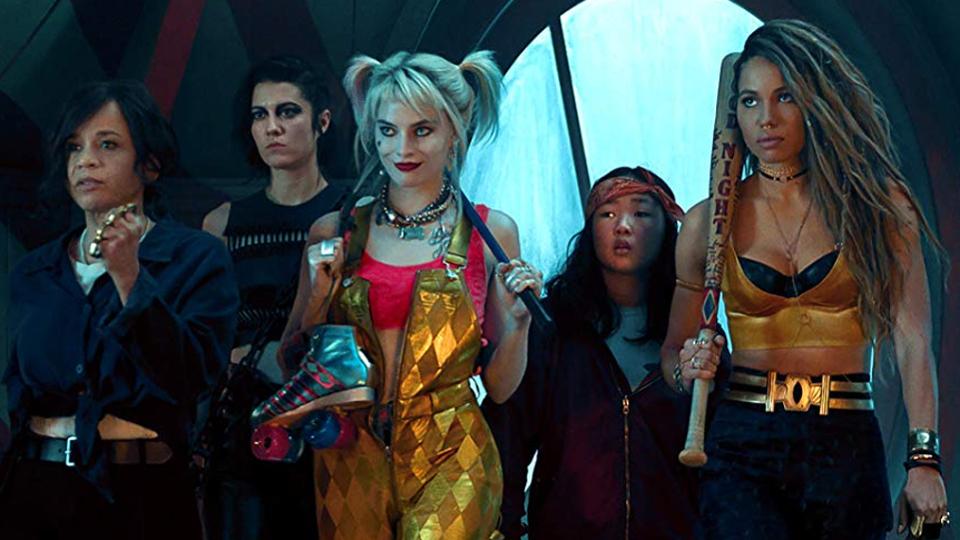
Easily the best parts of this film are the fight sequences. They are well-choreographed, light-hearted and hyperviolent in the vein of a Deadpool movie. Some are also accompanied with some killer music tracks – and while not all of them worked for me, this film does understand the importance of music to underscore action. Few films in the past decade did this effectively – Kick-Ass, Baby Driver, and Once Upon a Time in Hollywood to name some of the highlights. I do wish more films would take this approach, even if Birds of Prey takes this to an extreme in the same way its predecessor Suicide Squad did. That seems to be the recurring theme of the film: too much of a good thing can be equally as harmful as a bunch of bad decisions. And to be fair, the final 20 minutes are a total blast…I just wish the 100 minutes preceding weren’t just means to an end to get there.
There is a strong theme of female empowerment and taking down the patriarchy going on here. I will say that this is one of the few ways Harley Quinn could work as a main character: framing her story against the abusive Joker makes her a somewhat sympathetic character, as someone trying to escape the shadow of a villainous presence. While this might have been more effective if Joker himself was present in the narrative, they do give him a proxy in the form of Ewan Mcgregor’s Roman, yet another toxic alpha-male presence in Harley’s life. Her arc seems to be in learning to be independent rather than tethering herself to powerful men. However, if that is truly the case, wouldn’t it make more sense for her to start in that abusive relationship and gradually be trying to escape it? It seems the film blows its load too early by having Harley start at a place of independence rather than work her way towards it. Her character has nowhere to go! She ends up in the same place she started, and the plot should have taught her the lesson that she seems to have learned off-camera before the film even started.

In short, this movie wants you to have fun so badly, it’s loaded to the brim with popping colors and banging soundtracks and silly hyperviolence that doesn’t take itself too seriously. And yeah, I did have fun from time to time, but I grew so tired of the film trying too hard to entertain me every single second. The pacing is so lightning-quick that it’s hard to enjoy any individual moments or performances, even though there are some good ones. Margot Robbie clearly loves this character and you can tell she’s having a blast playing her, but the script is so goofy and one-note that the character itself felt flat despite all the glitz and glamor. Harley Quinn was never meant to be a protagonist, and while they did some interesting things with her to comment on the patriarchy and female empowerment, there just isn’t enough to her character to craft a compelling narrative around. Maybe I would have liked this more if I didn’t have a penis.
VERDICT: (5.9 / 10)
All images belong to Warner Bros. Pictures.
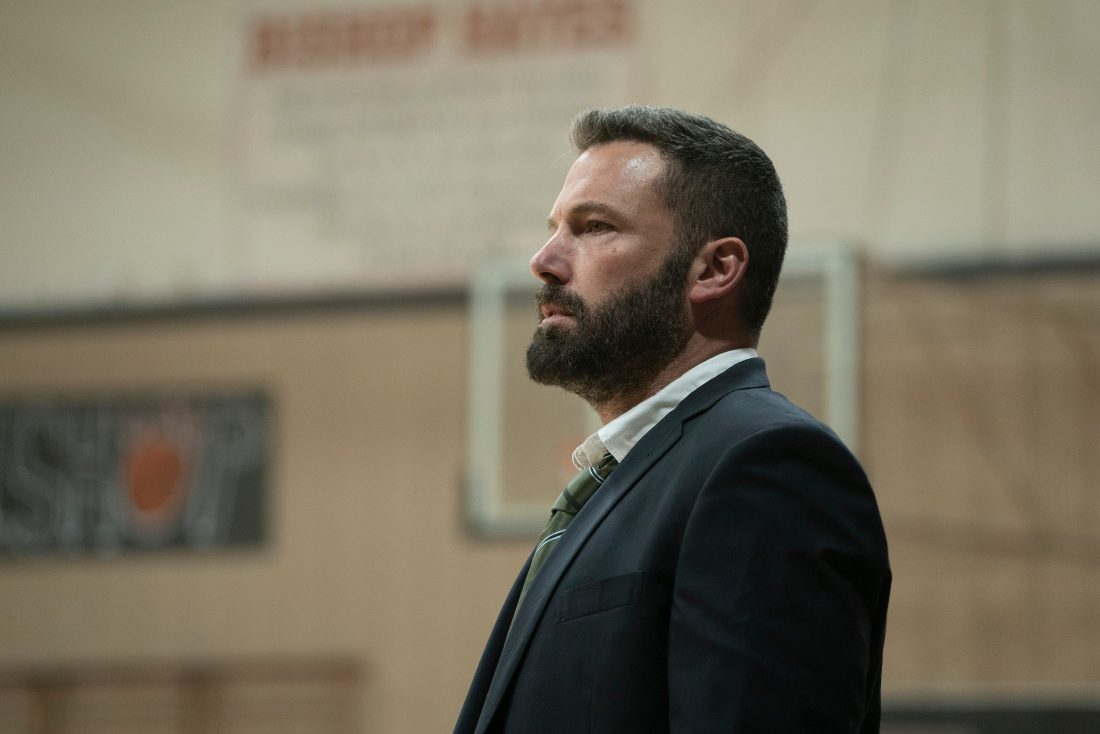
The Way Back
The Way Back is a sports drama from director Gavin O’Connor, telling the story of an alcoholic with a tragic past (Ben Affleck) who takes a head coaching position for a high school basketball team. O’Connor is the master of the inspiring sports drama, previously known for the classic hockey biopic Miracle as well as one of my favorite films of the previous decade, 2011’s Warrior. His films are often sappy, overly-sentimental and formulaic, but they are still so well-made and emotionally-charged that I still enjoy the hell out of them anyway. This film is no different; it follows the pattern you would expect from the underdog high school sports genre, but I was so invested in the characters and their journeys that I had an absolute blast.
Let’s start with Affleck’s performance, because it’s difficult to talk about this film without acknowledging his career trajectory leading into the film. He’s been on a bit of a downswing as of late; after winning the Oscar for 2012’s Argo, he was involved in the ill-fated Batman films, got divorced, and reportedly became an alcoholic. He’s the perfect match for his character Jack Cunningham in the film, as he is looking to make a similar comeback in real life. His performance is easily the best part of the film; we believe everything this character says and does because of Affleck’s committed and very personal performance. Of course he is a talented actor, so who knows how much of this was drawn from his real life, but it bears mentioning anyway.
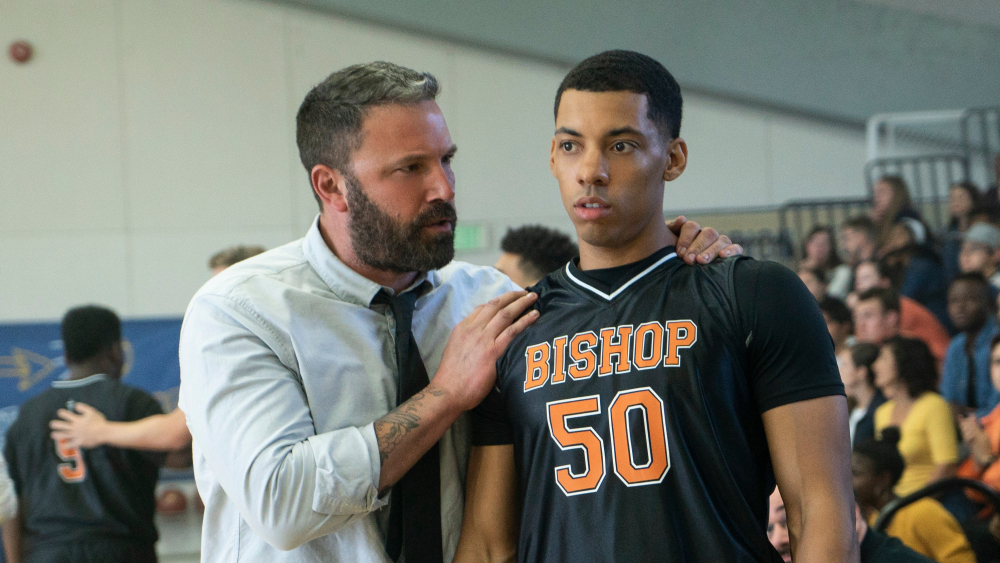
One of the reasons the story works so well is its dedication to sympathizing us to each individual athlete on the team. They all feel distinct: the shy point guard, the showboating center, the out-of-shape guard…there is additional drama beyond the results of the game as we want them to overcome their personal weaknesses as well. The film also wisely speeds through the normally-boring segments of the formula – the early growing pains, the tough conditioning, the student-athlete balance – in favor of a higher pace that gets us to the action quicker. Key segments are distilled into montages, and personal development is largely borne out of action in the games. Movies are generally shorter now than they used to be, and at barely 100 minutes, the film is able to cut out the filler and keep in only the essentials.
The ending deviates from the formula slightly to deliver something that feels fresh – even if it comes at the risk of a mild anti-climax. Jack’s personal issues are always simmering below the surface, and a “normal” movie in this vein would see him overcome them through his coaching gig and find personal victory in the team’s success. Instead, real life gets in the way for Jack, and his vices cause him to lose his job and force him to confront his problems head-on for the first time. The final fifteen minutes depart from the basketball court completely, which is a bit jarring but still maintains thematic cohesion. It might have worked a bit better if his personal life was a tad more fleshed out – that’s one aspect of the film that would’ve worked better with a longer runtime and more thorough character development stage at the start. Still, I’m willing to sacrifice a bit of clarity for the sake of pacing, and it still mostly works as-is.
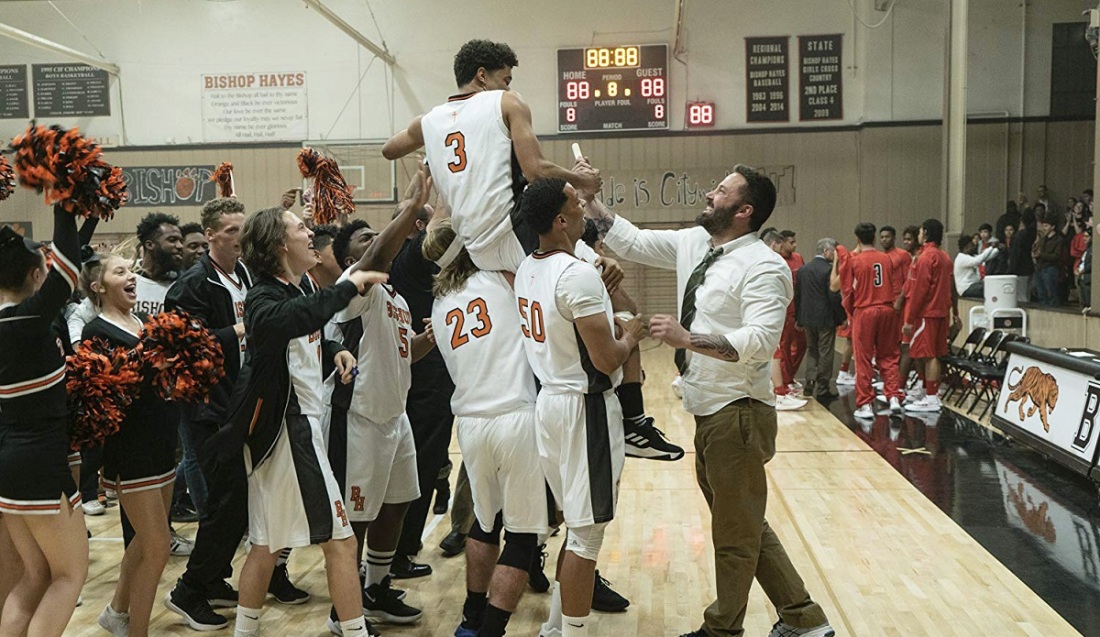
I enjoyed this more than I expected to. It reminded me a lot of Green Book: you know exactly what you’re signing up for when you sit down to watch it, but it’s so well-made, well-acted and emotionally-rich that it doesn’t matter how predictable it is. Ben Affleck is superb as the broken man at the story’s core, and his journey sends a powerful message about the dangers of addiction and the importance of dealing with grief in a healthy way. The curveball at the end of the film mostly worked for me, even if a bit more character development in the front half might have helped the sudden tonal shift go down easier. I’m giving it about as high of a grade as possible while still acknowledging that it is a formula flick through and through.
VERDICT: (8.5 / 10)
All images belong to Warner Bros. Pictures.
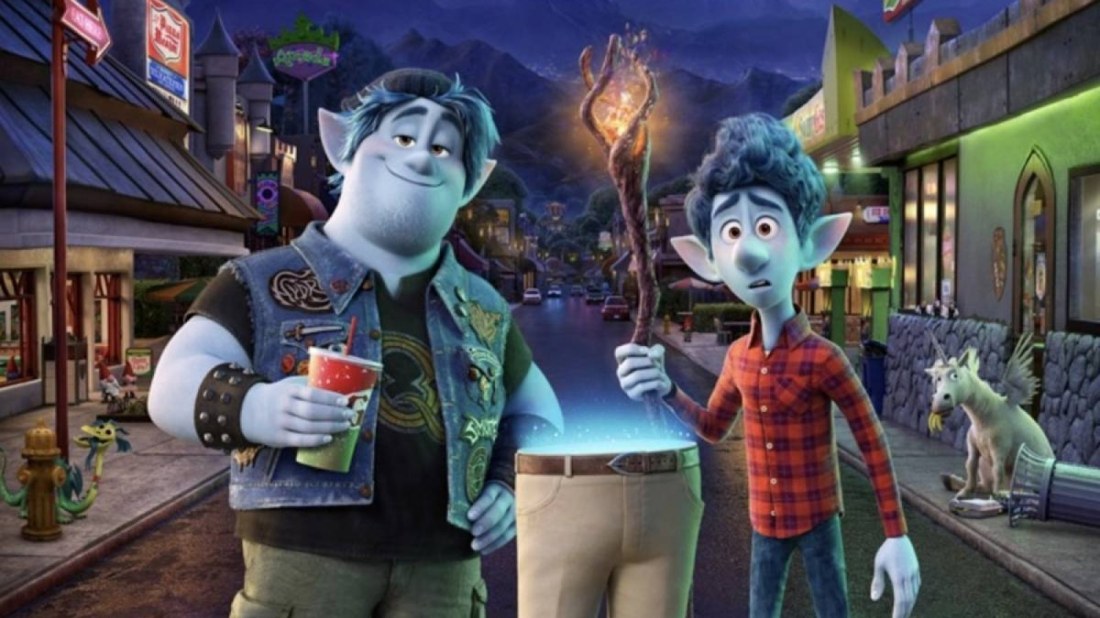
Onward
Onward is an original fantasy-adventure film from Disney/Pixar, telling the story of two elvish brothers who set off on an epic quest to reanimate their deceased father and spend one last day with him. It starts out like just about every recent Pixar outing: some hasty formulaic character development, a call to action, and a road trip adventure that takes us the length of the film. From the opening moments I was already starting to roll my eyes: here we go again. But what Onward does better than most animated film outings is craft its story around a compelling emotional theme. I can’t remember the last time an American kids’ film dealt with such a hard-hitting topic as a dead parent! And thanks to this, despite a dubious and inauspicious start, the film ended up working well for me and leaving a lasting impression after film’s end – a rarity for a kids film.
I do my fair share of bashing family films on this blog, but I’ll give credit where credit is due. One thing the genre tends to do better than almost any other is crafting compelling central characters with tangible wants, needs, and flaws. Sure, the genre tends to go for the least subtle version of that, but it still leads to good drama. Here we have Ian, a shy kid who wants nothing more than to talk to the father he never knew, and his brother Barley, a geeky washout who feels self-conscious about his lack of achievement in life. And the film does a good job of forcing these characters to confront their issues head-on and try to resolve them in a healthy manner. Ian learns to believe in himself more and respect his brother despite his alternative lifestyle choices. Barley learns to not worry so much about what others think of him and do what makes him happy. The quest to revive their Dad is more or less a distraction from the real story, which is the strengthening of the bond between these two brothers. Could it have been done more subtly? Sure. But you can’t ask too much of an animated film aimed at children, so I’m still satisfied.
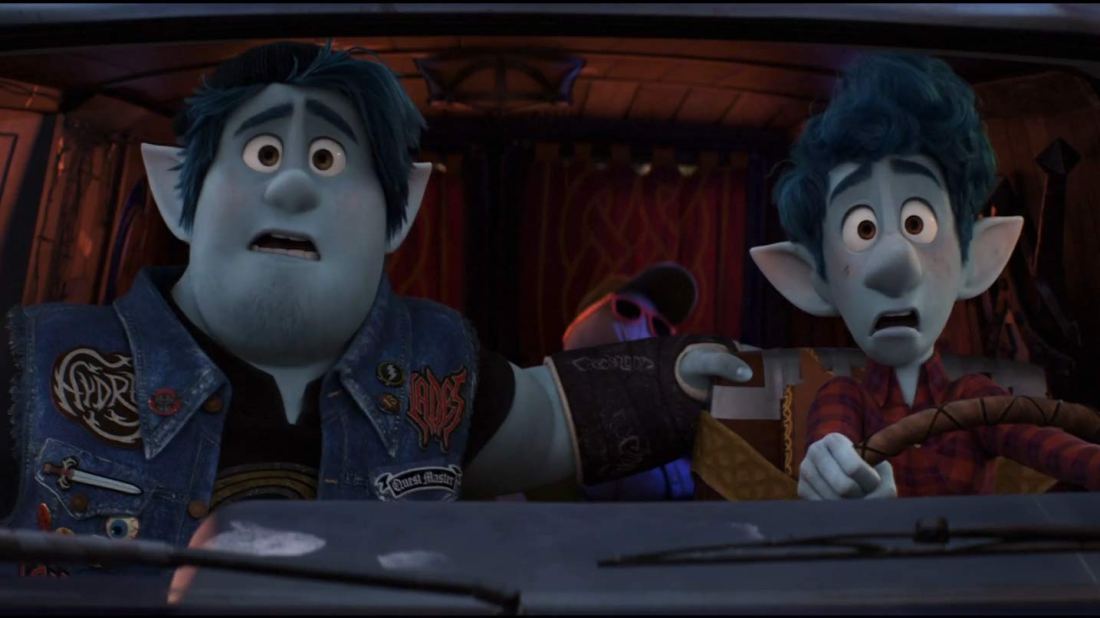
The film’s “post-fantasy” setting more or less accomplished the job it set out to do: asking the question of what a world would look like in which modern technology and industry replaced magic of old. There are a decent number of gags in which we see how these fantastical creatures like centaurs and pixies have adapted to new innovations like cars, and there is some decent humor involved. Not all of it works, but enough of it lands to get a pass from me. It definitely did feel like the writers were starting to exhaust all their ideas by the end, but they crossed the finish line intact at least. This theme also ties in nicely to one of Disney’s favorite themes: adults reconnecting with their childlike selves, or in this case their magical ancestry. Again, a topic they’ve done to death, but Onward puts enough of a unique spin on it that it worked for me. No complaints here!
The relationship between the two brothers, while rather ho-hum at the beginning, started to tug at the ol’ heartstrings by the end of the film. The big emotional climax of the film comes when Ian realizes that all the things he wished he could’ve shared with his Dad, he shared with his brother all along. And he makes the biggest sacrifice of all: giving up invaluable time with his father so that Barley can talk to him, missing him just as much and actually having known him before he passed. I’m fortunate enough to have not lost a parent yet, but I can only imagine how hard scenes like this would hit someone who has, child or otherwise. That longing, that desire to spend just one more day, one more hour, one more minute with a dead loved one has to be one of the most powerful motivations on the planet. For all its recent faults, Pixar has mastered the ability to appeal to both children and adults on an emotional level, understanding that kids have the depth to understand and appreciate such difficult topics. Kudos to them for handling it with the appropriate weight and not being afraid to make us cry!
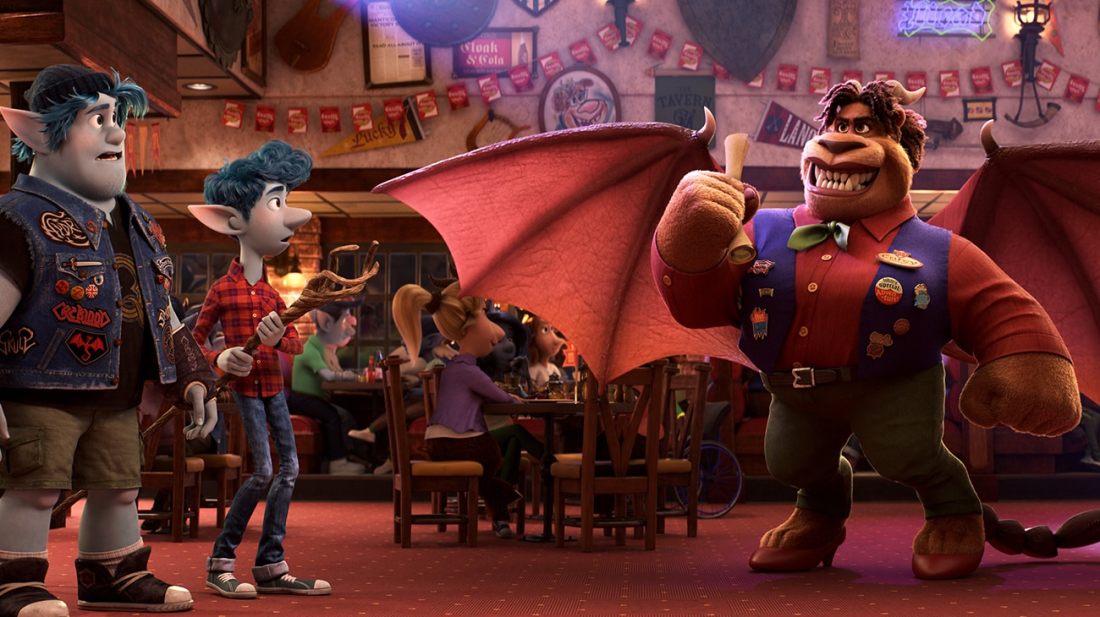
Despite this film’s typical genre trappings, I still enjoyed it quite a bit. The post-fantasy world setting led to some fun moments that never felt contrived or like they ran out of ideas. The relationship between the two brothers was heartfelt and made me legitimately emotional by the end. It’s rare for a kids film to have something as profound to say as this one does about grief and loss, so for that it gets extra brownie points. It would be hypocritical of me to bash Disney for rehashing the same IPs over and over while also lambasting their stabs at originality, and this is possibly the freshest film they have made since Inside Out. Don’t know how much replay value it’ll have because it’s still fairly obvious and boilerplate, but it’s a big step up for a studio that was starting to lose all my respect.
VERDICT: (8.0 / 10)
All images belong to Disney/Pixar.
Conclusion
Thanks for reading! A solid batch of films this time around, a rarity this early into the year, and I’m grateful their studios made the films available on digital so I could enjoy them without leaving the house. Hope everyone out there is staying healthy and sane in these scary times! May the magic of movies get you through to the other side unharmed. Hope to see you again soon!
-Austin Daniel
All image rights belong to the films’ respective studios.